Breaking Down Our Past

Uncovering the unwritten rules of discrimination in our Sorority's selection process
PAGE 14
Spring 2023
GAMMA PHI BETA
3 SENTIMENTS
Letter from International President Autumn L. Hansen

4 BUILDING STRONG GIRLS
Girls on the Run Future CEO representative Molly Fowler
6 PACE, PLEASE!
Getting clear on your priorities and taking back your calendar
8 BUILDING ON YESTERDAY
1 20 years of Lambda Chapter (University of Washington)
10 THE BEDI SUMMIT
14 BREAKING DOWN OUR PAST
Uncovering the unwritten rules of discrimination in our Sorority's membership selection process
32 LIFE LOYAL
34 FACILITIES MANAGEMENT COMPANY

Delicious dishes that foster sisterhood
36 THE FOUNDATION
How the BEDI Summit reinvigorated Sally Wallace’s engagement in Gamma Phi
38 IN OUR HEARTS
40 GAMMA PHI VIBES
The Gamma Phi Beta aesthetic in everyday places get
A recap on our third annual Belonging, Equity, Diversity and Inclusion (BEDI) Summit
Send us snail mail, join our newsletter and find us on social.
in touch
9155 E. Nichols Ave. Suite 330, Centennial, CO, 80112 @gammaphibetasorority Gamma Phi Beta GammaPhiBeta.org
in
issue 2
this
Four women went to college. Without context, this seems mundane, usual in today’s world. Within context, specifically the context of 1874, our understanding of this statement and its meaning is much deeper.

When I think of the role belonging, equity, diversity and inclusion play in our organization, I look back to our Founders. In 1874, Helen, Frances, Addie and Mary were the first of a handful of women to attend Syracuse University. What must it have been like for our Founders to enter spaces that had, until their arrival, been off-limits to them? Their privilege allowed them access to higher education while women of minoritized identities continued to face discrimination and exclusion. Still, our Founders faced exclusion and discrimination, making their courage profound.
What made our Founders courageous act tolerable? They had each other to embrace and welcome into a shared space. Sisters who said, “I believe in you. I see you for all you are and could be, not what the outsiders say you can’t be.”

...
When sisters read this issue of The Crescent far into the future, I hope they see that we were learning and growing; understanding the ways our ignorance was limiting the strength and capacity of our sisterhood; and that we were seeking something better. If we are not actively looking at how our organization has let the outside world (the biases, bigotries, discrimination and hurt) creep into our sacred spaces, we are falling short of our Founders origin story of wisdom, love and truth.
Much love in IIKE, Autumn
L. Hansen
International President
WHO IT AUTUMN?
Read Autumn's letter in its entirety on Page 16.
Autumn Hansen is currently serving her second term as International President of Gamma Phi Beta. Autumn also serves as the International Council (IC)-appointed Gamma Phi Beta Foundation Trustee and is a member of the Audit and Finance Committee, the Bylaws Committee, the Extension Committee and the Governance and Personnel Committee. Autumn has served on IC since 2012 as Education Vice President (2012-16), Alumnae Vice President (201618) and Vice President (2018-20). Before becoming International President, she chaired the Sorority’s Governance and Personnel Committee and was also a member of the Leadership Development Committee. A member of Xi Chapter at the University of Idaho, Autumn has Bachelor of Science degrees in sociology, psychology and crime and justice studies as well as a master’s degree in social work from Indiana University.
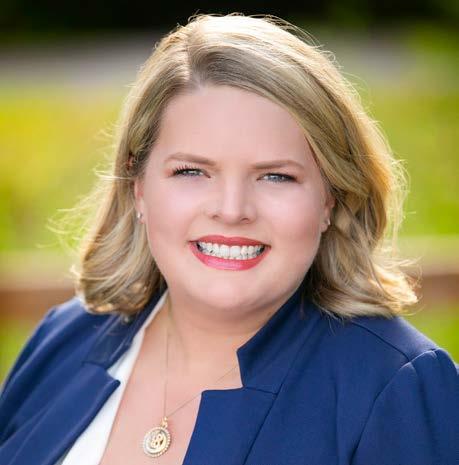
3
3
Tomorrow's Female Leaders
Girls on the Run (GOTR) played an integral role in Molly Fowler’s life, starting from a tender age. Molly was a GOTR participant from third to fifth grade and then joined its sister (middle school) program, Heart & Sole, from seventh to eighth grade. Girls on the Run popped up again during college recruitment, where Molly learned about Gamma Phi Beta’s connection to the organization. She knew our True and Constant sisterhood was the right place for her. “I felt immediately connected to Epsilon Kappa Chapter (California State-Chico) and instantly at home,” she says.
Molly dove headfirst into chapter life, especially relating to all things Building Strong Girls and GOTR, when she joined Gamma Phi Beta in 2021. She has coached six different GOTR teams, served as her chapter’s philanthropy chair, was offered a junior member board position with GOTR North State, and, more recently, interned for the council. Through her internship, Molly learned about and was encouraged to apply for The Future CEO Program with GOTR partner, HERSHEY’S.
The newly launched program was a one-day leadership development opportunity designed to help drive mentorship for young girls and women with leaders from The Hershey Company, including President and CEO Michele Buck.
“The program was first introduced to me by Claire Johnson, the council director for GOTR North State. Claire has opened many doors for me through GOTR, so when she reached out
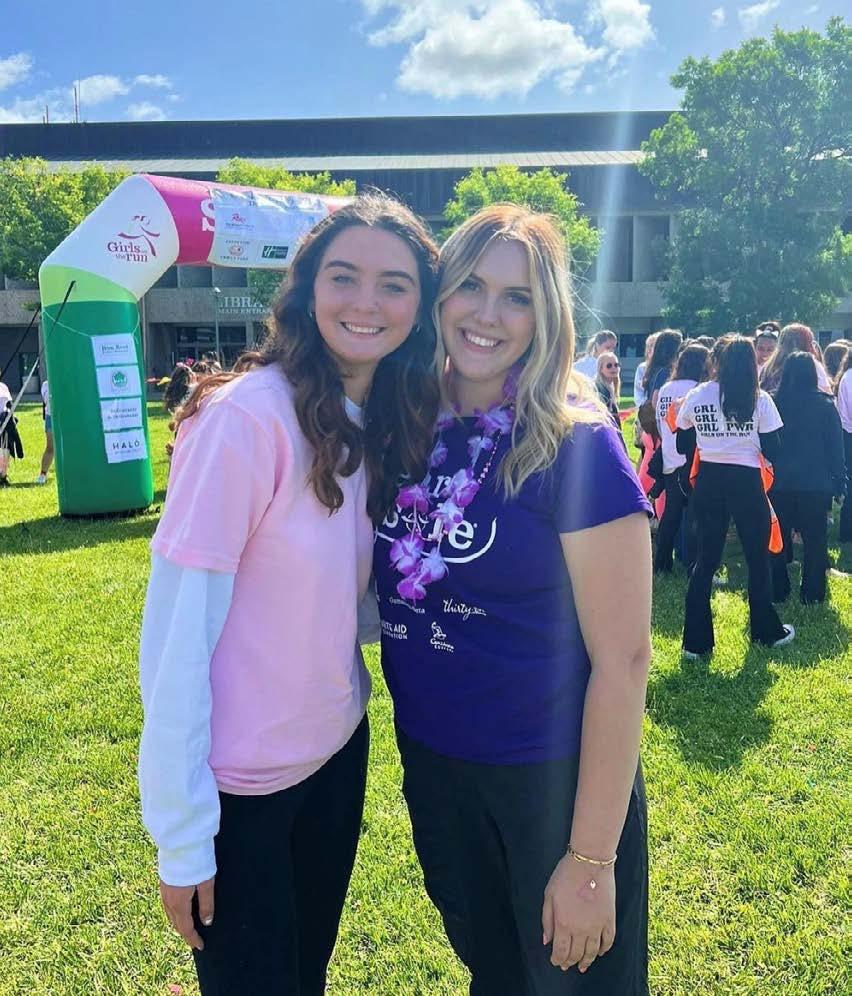
to me and suggested I apply [for this program], I recognized how unique and rewarding of an opportunity it was and applied,” Molly explains.
Molly went into the application process with an open mind since hundreds of women and girls were applying for one of only 10 spots. After receiving a referral, which was a mandatory qualification to apply, Molly shared more about her involvement with GOTR and how she could benefit from the Future CEO Program. Just a
4
Molly Fowler (California State-Chico) representing Girls on the Run for the Future CEO Program with HERSHEY’S
few weeks after submitting her application, Molly’s acceptance letter arrived in the mail.
“It was January 9 when I received my acceptance letter into [the Future CEO Program], and I was ecstatic! I told my mom and then immediately called the GOTR North State council to tell everyone at the office the good news,” Molly shares.
Molly and four other applicants representing GOTR were selected to participate in the program alongside five applicants representing HERSHEY’S international partner, Girl Up. On March 8, 2023, International Women’s Day, Molly and her fellow Future CEO representatives met for a day jam-packed with mentoring opportunities and hands-on experiences in interviewing, collaborating and networking. By the end of the day, Molly and her peers received a certificate of completion, an academic scholarship to further their educational pursuits and connections with female CEOs and leaders in various fields, like Geetika Mehta, managing director for HERSHEY’S India.
“Geetika shared so many useful tips and notes with me. It was really motivating to hear more about her experience as a female leader in a male-dominated industry," Molly says.
Besides Geetika, Molly gained valuable insight from other female powerhouses like President and CEO of The Hershey Company Michele Buck, CEO of GOTR International Elizabeth Kunz and Girl Up CEO Melissa
Kilby. Molly adds, “These women’s stories were so inspiring and opened my eyes to what possibilities could be available to me in my future.”

Is becoming a CEO part of this Gamma Phi’s future path? Maybe! Molly knows she wants to pursue a career that not only aligns with her interests, values and strengths but also makes a positive impact on others. Until the future illuminates exactly what that is, Molly is content focusing on her studies, making memories with her sisters and supporting GOTR.
“Girls on the Run and Gamma Phi Beta have brought so many opportunities into my life that would not have been available to me, and I am forever grateful and honored to be a part of two organizations that do so much good for the people around us,” Molly says.
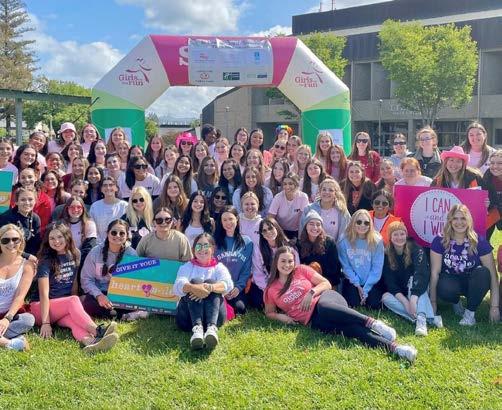

5
“Girls on the Run and Gamma Phi Beta have brought so many opportunities into my life that would not have been available to me.”
Doyouprescribetothe badgeofbusyness?
The
thingsDoyouhaveinyourlife thatmakeyoucomealive?
ICKTest
Getting clear on your priorities and taking back your calendar
 By Christina Glickman (Kansas)
By Christina Glickman (Kansas)
toDoyoufeeltheneed withfillyourspaceeveryday “something?”
Do you say yes to things that don’t align with where you want to be?
Doyoufindthatyou explainyourselfoften?
PACE, Please! 6
In this new post-pandemic world (if we can call it that), it felt like we all collectively looked at our calendars and sighed. If anything revealed what our true priorities were, it was the pandemic. That positive feeling many of us had about more space, more time to connect to those within our places of comfort and the opportunity to just “be” doesn’t have to fall by the wayside just because the normalcy of life has resumed.
It begins with the Sunday night ICK Test.
This test has been a lifeline for me in getting clear on protecting the most precious human commodity: time. It allowed me to conserve my energy and get clear on my priorities. Now, I understand where best to put my energy and how to get some much-needed time back.
If you want to take back your calendar, too, start each week with the ICK Test. Here’s how.
Ask yourself some of these tough questions:
It starts by evaluating what is on our calendars and what we want to prioritize.
When you say yes to something, that decision shouldn’t make you feel the need to cancel or do something else with your time. If it does, ask yourself why. How can you eliminate it or not default to saying yes next time?
Tune In
Listen to Episode
Four of Christina’s podcast, “XTRA Life & Style Unscripted,” for a deeper dive into the ICK Test.

Are you saying yes to things because you feel like you should? Imagine the feeling of looking to the week ahead with a calendar chosen and curated by you. You might feel relief knowing your week isn’t full of to-dos you don’t want to do (though sometimes that’s not always the case, but you get me here).
It’s the coffee you said yes to that drains your soul. All those extra yeses comprise time with yourself and your family. Let’s stop people-pleasing, saying yes to everything and giving more than we receive. No is a complete sentence.
That is the ICK Test. Ultimately, it becomes the art of creating space for yourself.
• Do you say yes to things that don’t align with where you want to be?
• Would you like to give more of your energy to the places where you receive it back?
• Does your calendar feel like it is filled with things YOU want to be doing?
• Do you have things in your life that make you come alive?
• Do you prescribe to the badge of busyness?
• Do you feel the need to fill your space every day with “something?”
• Do you find that you explain yourself often?
These questions will help guide your heart and head as you prepare for your week ahead. The reality is on Sunday, most of us look at our week, and the items on our calendars can elicit a feeling of dread. The ICK Test’s goal is to bring awareness and enable us to replace those dreaded, icky items on our calendars with things that fill us with joy and allow us to live our lives how we want.
So, grab your calendar, go day-by-day and ask yourself some of those tough questions and begin to invite in more being, possibly less doing. Living a life with a little more XTRA. Once you try it, I promise you will never go back.
Christina Glickman is a TEDx speaker, podcast host, bestselling author of “Xtra: The Art of Being” and founder of the Xtra Love Army movement. She was recently featured in Elle and Harper’s Bazaar for her Paris Fashion Week looks. She is a mother of four and lives to champion others to show up in life unapologetically, to live a life XTRA.
For more confidence-boosting tips, check out:
Xtra.MyKajabi.com
XTRA: Life & Style Unscripted
@christinaglickman2

7
On May 17, 1903, Lambda Chapter at the University of Washington in Seattle, Washington, joined our ever-evolving circle of sisterhood. That’s 120 years of True and Constant connections created, 120 years of empowering women embodying our Core
Why Gamma Phi?



Values of Love, Labor, Learning and Loyalty and 120 years of cherished memories to last a lifetime. To celebrate, we asked some of Lambda Chapter’s 2023 collegiate leaders the following: Why Gamma Phi?
During recruitment, I was instantly drawn to the genuine Gamma Phi women who made me feel so comfortable. I began to look up to and admire all the women I spoke to that week. I am so thankful for this Sorority and the amazing role models, memories and best friends it has brought me!
“I wanted to surround myself with women who empower me to be a better version of myself every day. Through the laughs and the tears, I know there is always someone to support me and help me grow.”
—Chapter President Grace McKenzie
8 YesterdayBUILDING ON
Pictured above: Answers and Lambda facility illustration courtesy of GammaPhiBetaUW.com
1 903
"I chose GPhi because it was the place I felt the most loved and supported."
—Membership Vice President Emily Bendickson
—Administrative Vice President Saivi Madan
We recently launched Shop Gamma Phi, a marketplace of licensed vendors, including Crescent Corner. From graduation stoles to gifts to clothing, Shop Gamma Phi is the place to go for all your True and Constant gear. ShopGammaPhi.com








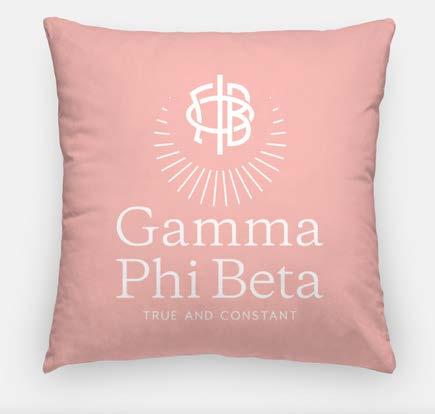


1
A. Classic Crescent Necklace, #3432 | B. Classic Monogram Charm with 18” Snake Chain, #3433A | C. Bolo Bracelet, #H3996B | D. Floral Design Chased Badge, #0101 | E. Crest Guard with Enamel, #9006 | F. Crown Pearl Badge, #0104 | G. Scholarship Pearl Dangle, #41 | H. Administrative Vice President Dangle, #02 | I. Betsy Ring, #BETSY | J. Bristol Ring, #BRISTOL | K. Cora Ring, #RP3400 | L. Stackable CZ Band Ring, #143864 | M. Addie Ring, #ADDY
D.
A.
B. C. E.
K. L. M.
L. GPhiB 2023Mar ad R3_FINAL.indd 1 4/3/23 3:12 PM
you hear?
F. G. H. J. I.
M.
Did

10
The Third Annual Belonging, Equity, Diversity and Inclusion
Summit
By Director of Education Jenny Campfield
On February 25, 2023, Gamma Phi Beta hosted the third annual Belonging, Equity, Diversity and Inclusion (BEDI) Summit. This year’s summit focused on ability, a topic requested resoundingly by members across Gamma Phi Beta’s educational programs. The event featured two keynote speakers, updates on the Sorority’s BEDI work, a live panel of organizational leaders and more.
To increase inclusion within the BEDI Summit, this year’s event offered a variety of accessibility features including but not limited to:
• Verbal visual descriptions of all presenters.
• Fully redesigned educational materials that utilized alt-text on images, high-contrast
2023 BEDI Summit Fast Facts
text, horizontal formatting to increase screen reader compatibility and more.
• Downloadable text-based resources to support audio-based content.
• Closed captioning in all sessions.
• A list of accommodations provided during registration, with additional accommodations available upon request.
This year, Gamma Phi Beta was thrilled to host keynote speakers Imani Barbarin and Nitika Chopra. Check out their bios and a brief overview of their keynote content on the next page to connect with the learning fostered during the 2023 summit.
11
1,460 attendees participated in the live virtual event. Attendees joined from the United States, Canada, Mexico, Italy, France, Panama and the Netherlands.
11
4,500 total live viewing hours.
Imani Barbarin
Imani Barbarin is a disability rights and inclusion activist and speaker who uses her voice and social media platforms to create conversations that engage the disability community. Born with cerebral palsy, Imani often writes and uses her platforms to speak from the perspective of a disabled Black woman. In the past few years, she has created more than a dozen trending hashtags, allowing disabled people the opportunity to have their perspectives heard while forcing the world to take notice. #PatientsAreNotFaking, #ThingsDisabledPeopleKnow, #AbledsAreWeird and others each provide a window into disabled life while forming community.
Imani is from the Philadelphia area and holds a master’s degree in global communications from the American University of Paris. Her work has been published in Forbes, Rewire, Healthline, BitchMedia and more.

During the 2023 BEDI Summit, Imani shared her personal experience as a Black woman with cerebral palsy. She shared how she faced exclusion as a child, and how support from her family shaped her understanding of herself. Imani also engaged attendees in learning related to systemic discrimination disabled people face and the differential impact people with disabilities who hold other marginalized identities experience.
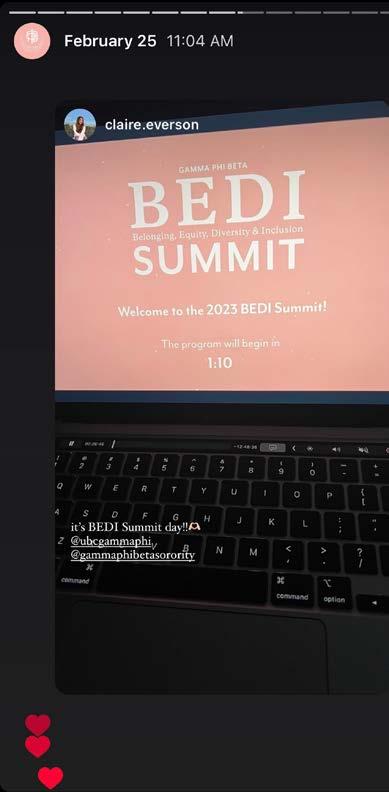
“I’m
sharing her
excited to use what she shared to make our chapter more inclusive and help all Gamma Phi Betas feel like they belong.”


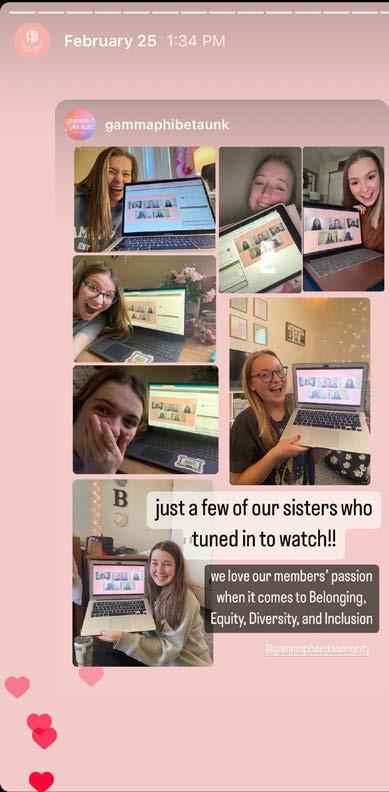
12
“Imani was great! It was really meaningful to have someone share an intersectional perspective, as this can often get lost in conversations about diversity and inclusion.”
really grateful to Imani for being so vulnerable in
story. I’m
What members have to say about Imani's keynote:
Nitika Chopra
Nitika Copra began her career more than 10 years ago as the founder of a popular online magazine, the host of her talk show on global television and a brand ambassador for some of the most prestigious beauty brands. During her professional successes, she felt a deep longing for something more; something she could create that would truly have an impact on the lives of others. That passion sparked the idea to create Chronicon.
After 10 years in content creation, Nitika launched Chronicon, an inclusive communitybuilding event focused on those living with chronic illness, in fall 2019. The New York City event sold out, had 2,000 livestream viewers and high-level brand sponsors.

Now, Nitika is excited to announce that Chronicon is expanding online with The Chronicon Community, a new, accessible online space with inspiration, advocacy and empowerment for chronically ill people across the globe to connect.
During her keynote, Nitika shared her personal experience as an Indian woman with psoriasis and psoriatic arthritis. She explored how her life has been impacted by chronic illness and how she’s learned to cope and thrive with chronic
Continued Learning
conditions. Nitika also challenged attendees to make the invisible visible by exploring how common chronic, non-visible illnesses are and provided strategies for both chronically ill people and their allies to create more loving, inclusive spaces for people with chronic conditions.
“Prior to hearing Nitika speak, I had no idea how common chronic illnesses are. I was really surprised to see so many people share in the chat that they or someone they know are chronically ill. She definitely changed my perspective about invisible disabilities and chronic illnesses.”
“As someone with a chronic illness, Nitika’s keynote made me feel really seen. I feel more empowered to advocate for myself, to share what I’m going through and lean on my sisters.”
Didn’t get a chance to attend the 2023 BEDI Summit? Not a problem! Gamma Phi Beta is delighted to support your continued BEDI learning and growth in a variety of ways, including through the resources provided on the BEDI Resources webpage. This curated list of resources is updated annually to provide resources that align with the BEDI Summit’s educational focus. Check out the Disability Resources section on the BEDI Resources webpage today to continue your learning and enact change within Gamma Phi Beta and beyond.
13
13
What members have to say about Nitika's keynote:
Breaking Down Our Past
Uncovering the unwritten rules of discrimination in our Sorority's membership selection process

14
By Historical Research Associates, Inc. (HRA) in partnership with Gamma Phi Beta
Content Warning
Many of the historical materials reviewed for this project use language that is not acceptable. The content of this article may be emotionally challenging or upsetting. These historical documents are reproduced or quoted as they were originally written. They reveal racial attitudes and offensive practices common to the era in which they were written. Their inclusion is not an endorsement of behavior, past action or past inaction. It is a call for our collective accountability and improvement.

15
Dear Sisters,
Four women went to college. Without context, this seems mundane, usual in today’s world. Within context, specifically the context of 1874, our understanding of this statement and its meaning is much deeper.
When I think of the role belonging, equity, diversity and inclusion play in our organization, I look back to our Founders. In 1874, Helen, Frances, Addie and Mary were the first of a handful of women to attend Syracuse University. What must it have been like for our Founders to enter spaces that had, until their arrival, been off-limits to them? Their privilege allowed them access to higher education while women of minoritized identities continued to face discrimination and exclusion. Still, our Founders faced exclusion and discrimination, making their courage profound.
What made our Founders courageous act tolerable? They had each other to embrace and welcome into a shared space. Sisters who said, “I believe in you. I see you for all you are and could be, not what the outsiders say you can’t be.”
In Gamma Phi Beta’s evolution, we have seen periods of connection and distraction to this origin story. I believe now we are connecting to our Founders' truest intent of creating a brave space of fellowship, learning and support for women during a time when
spaces like that did not exist. The task of contextualization was first recommended by the Belonging and Inclusion Task Force in 2019. In anticipation of our 150th anniversary, we knew we couldn’t celebrate authentically without truly knowing all our history. To help us contextualize our history and increase our understanding of our own narrative, we engaged our partners at HRA. In November 2022, HRA provided International Council (IC) with a 100-plus page report that uncovered the unwritten rules of discrimination in our Sorority’s membership selection process. This issue’s cover story was taken from that report.
Oversimplified, reading this article is hard, and I personally have felt shame, anger and sadness. My hope is when you read this article, you allow yourself to feel the full range of emotions. And then explore why these feelings might be heightened for you. It can be difficult to hold space for seemingly contradictory ideas, but it is possible. Gamma Phi Beta is a
loving sisterhood and Gamma Phi Beta is flawed.
In preparation for this publication, I’ve been asked: Why we would share this article with the world? Why not keep it restricted to members only? In my professional work, I am a licensed clinical social worker. A well-known adage in substance abuse recovery communities is our secrets keep us sick. This sickness that is part of our story cannot survive when it is brought into the light. In ritual, we reference inspirational texts that include similar adages. Our secret motto also supports the need to shed light on the totality of our history. This article isn’t only for our members to process, but it is also an attempt to acknowledge the women who were denied membership because of their minoritized identities.
It has been said that being a membership organization makes us inherently discriminatory. Membership selection is flawed because it is practiced by humans, all who have biases. Yet, discrimination becomes a
16
From Your International President
"When reconciling Gamma Phi Beta’s role in discrimination and racism (specifically in but not limited to membership selection), a critical step of accountability is taking full acknowledgement and ownership of our past wrongs."
From Your IC

Gamma Phi Beta holds a deep commitment to belonging, equity, diversity and inclusion. As one element of this commitment, we support the process of historical contextualization. Becoming a more welcoming sisterhood involves actively seeking to understand who has been excluded from membership over time for reasons not consistent with our published membership criteria. This process of knowing and reconciling with all our history, including elements that are uncomfortable and unfavorable for members and the public alike, is an important step in building a stronger Gamma Phi Beta. We believe this is our best path toward remaining connected to our sisters of the past, present and future.

17
Breaking Down Our Past

Over its 150-year history, Gamma Phi Beta has been an organization predominantly centered on white, heteronormative, Christian, affluent women. Its members have collaborated with other predominantly white, heteronormative, Christian and affluent Greek-letter organizations on predominantly white college campuses across the United States and Canada. Its membership recruitment policies have historically created and reinforced systems of discrimination. This article explores the systematic, pervasive ways in which racism and inequality have impacted Gamma Phi Beta’s membership selection process for nearly 150 years.
There is no easy way to capture the experiences of individuals who chose not to join Gamma Phi Beta or who chose to leave it. It is also impossible to capture the private thoughts of the Sorority’s alumnae or collegiate members, or the conversations that happen behind closed chapter room doors. This history focuses on the international organization to understand how Gamma Phi Beta’s collective attitudes have changed over time and continue to change.
Historians visited Gamma Phi Beta’s International Headquarters in Centennial, Colorado, and conducted research in the archives and museum collections held there. They reviewed Gamma Phi Beta published materials, such as “The Gift from Syracuse” and issues of The Crescent, as
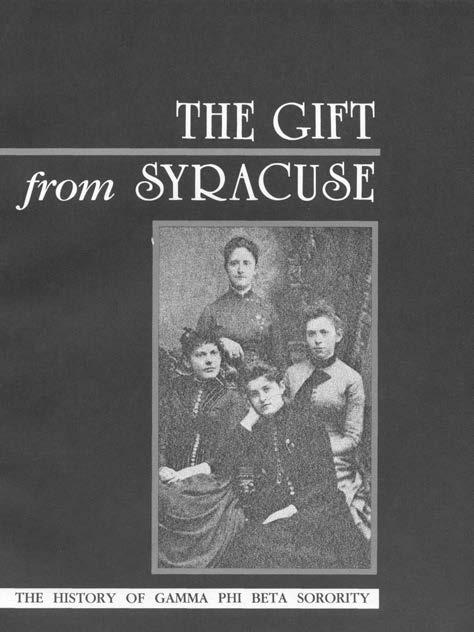
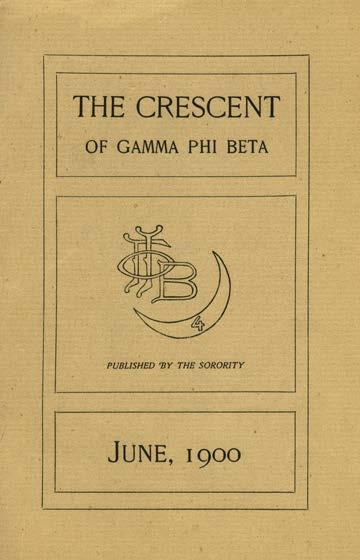
well as secondary scholarship, news articles and materials from archival collections of universities. Although The Crescent and other published reports offer some insight into chapter-level activities, the sources reviewed are primarily from the international level and do not include substantial research in collegiate chapter records or alumnae records. The report authors are not initiated members of Gamma Phi Beta. In all research, great care was taken to avoid viewing materials reserved for initiated members
only or discussing ritual-related information.
Gamma Phi Beta hired HRA to draft a report detailing the ways in which Gamma Phi Beta contributed to or challenged the history of racism and discrimination in the United States and Canada. This report is part of that historical investigation.
18
This history focuses on the international organization to understand how Gamma Phi Beta’s collective attitudes have changed over time and continue to change.
A Privileged Place

The Founders of Gamma Phi Beta were among the first generations of American women to gain access to colleges and universities. In 1870, less than one-third of American universities allowed women to enroll. Men outnumbered women nearly five to one. Sororities offered an important opportunity for women to find social and academic solidarity on campuses often hostile to their presence.
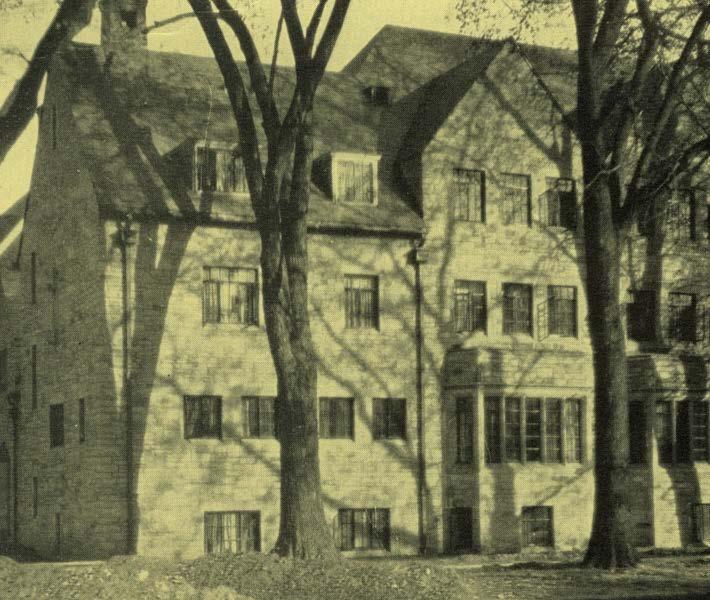
College campuses of the late nineteenth century often refused to admit non-white students, reflecting and upholding prejudices that were widespread among the mostly white individuals who held most of the country’s wealth and power. Early college students — both male and female — often came from Protestant families of relative economic security. These students were almost universally white and descended from merchants, doctors and other professionals. The oldest women’s fraternities did not knowingly pledge non-white members, according to historians, at least partially because college campuses were predominately white spaces.
Margaret L. Freeman, historian and author of “Women of Discriminating Taste: White Sororities and the Making of American Ladyhood,” credited sororities as playing a “valuable role as spaces of women’s friendship during the early years of coeducation.” Freeman noted,
however, that sororities have also been “inherently discriminatory, whether they be selecting members according to social class, religion, race or physical attractiveness.”
In the 21st century, fraternities and sororities have increasingly found themselves under fire for their perceived failures in addressing allegations of discrimination, hazing and sexual violence. The Abolish Greek Life movement threatens the organizations’ very existence after centuries of social prominence.
Increasingly, anti-Greek sentiment has come from within the system. In July 2020, IC discussed “an emerging trend of collegiate chapters exploring options to disaffiliate from their international organization as a response to demand anti-racism action. In the same year, Epsilon Chapter (Northwestern) members voted to surrender their charter, citing the organization’s overall inability to
address systems of discrimination and inequality. A member who disaffiliated with Delta Tau Chapter (Colgate) in 2017 could no longer endure the “two sides” of her personality: one that studied and critiqued conformity and whiteness, and one that participated in the homogeneous culture Gamma Phi Beta and Greek Life created. A member who disaffiliated with Delta Tau Chapter (Colgate) in 2017 could no longer endure the “two sides” of her personality:
19
one that studied and critiqued conformity and whiteness, and one that participated in the homogeneous culture Gamma Phi
Beta and Greek Life created.
Breaking Down Our Past Discrimination in Membership Selection
Gamma Phi Beta’s initial Constitution and Bylaws, as set in 1874, called for membership selection based on “grade of scholarship, intelligence and deportment.” In the 1920s, newly installed chapters were encouraged to recruit “earnest, high-minded students” from a “good family.” Rather than focus on a single personality, Gamma Phi Beta advised chapters to strive for “an all-around membership” and encouraged recruiting students, campus organizers, social girls, athletic girls and artistic girls.
Gamma Phi Beta’s early Constitutions required the approval of three active collegian members before a new member could be considered for admittance to the sorority. Active members have long selected new members via a secret ballot process. In many cases, “unanimous vote of all active members” was required before extending an invitation.
From the outset, Gamma Phi Beta used physical appearance to judge potential new members during the recruitment process. A 1910 editorial in The Crescent cautioned, “Be sane in your rushing. Do not let yourselves be influenced only by the girl’s appearance, social qualifications or bank account, but look for the higher qualities that are so to be desired in sorority life; seek in your freshmen the true worth, the loyalty and the womanliness that will make them strong and splendid alumnae.”
But in describing the freshmen of Gamma Phi Beta the next year, an alumna was quick to note: “Personal appearances and habits should be most closely watched. These things, seemingly so small, must be counted among the foremost responsibilities.”
Alumnae included physical appearance on the recommendation forms required for all new members. While the recommendation blank form included many lines of information ranging from high school grades to “standing in community,” it also included a line to describe “personal appearance.” In the recommendation manual distributed in 1947, the model form example described a potential member as “blonde, blue eyed,
medium height, dresses well.”In 1957, the form requested a “picture or clipping” be included in all forms, “if possible.” While not explicitly a tool of racial discrimination, the focus on physical appearance invited both collegians and alumnae to make decisions based on their biases and perceptions.
And if members had questions about the recruitment expectations, they inquired with the international offices for guidance. In 1948, a collegiate chapter wrote to Grand Council and received the following response. “You ask what our National response would be to the inclusion of a Jewess, Negro or Oriental to our membership.” Grand Council's response assured the collegian that Gamma Phi Beta would not revoke a chapter charter so long as a new member had received the appropriate alumnae recommendations. However, it also noted:
"If you mean opinion of other chapters and our members in general, of course there would be quite an upheaval and sharp criticism. Common sense would indicate that it would be quite surprising if persons with

20
such extremely divergent racial backgrounds would be happy in a closely bound group where the unanimous vote was necessary for admission…Any woman in the United States or Canada with certain specific educational requirements satisfied has a right to be considered for membership, but the fraternity has an equally strong right and privilege of considering whether she will fit in with the traditions, ideals, aims and personalities of the existing membership."
Grand Council also included a note to a fellow Gamma Phi Beta staff indicating “one of these letters crops up every once in a while” and that they had written “a similar letter” just months before. Grand Council's answer was a matter of unwritten — but pervasive — policy.
In 1951, a Canadian chapter sent a letter to Grand Council and reported:
"Apparently, by some error, Panhellenic sent rushing cards to three Oriental girls. One of these cards has been returned saying that she did not wish to be rushed, but nothing has been heard from the other two. They may go through rushing, and yet they might not, but we would like to know the ruling because we suspect that Gamma Phi Beta is just for Anglo-Saxons."
While the response from Grand Council stressed “Gamma Phi Beta has no discriminatory clauses,” it also advised, “In an international organization, our members must be compatible no matter what chapter they may be associated with or where they locate as alumnae,” as well as an ability to “attract desirable girls to Gamma Phi Beta in the future.” In 1954, Grand Council advised against
would be considered for financial assistance.
Gamma Phi Beta began reevaluating its membership selection policies in earnest during the 1980s. In the 1990s, Gamma Phi Beta leaders recognized that an increasing number of students faced severe economic challenges in paying for college.
make

allowing “foreign students” from residing in chapter houses, suggesting any housing be shared between National Panhellenic Conference (NPC) organizations on a rotating basis; a “foreign student” could only be initiated with “special permission.” Even if they were initiated, Grand Council indicated no “foreign student”
Sorority leaders attempted to address changing student demographics without any major changes to the system of evaluation. In 1995, an informational packet for Gamma Phi Beta described its membership selection process as “an affirmative rating system” where “each collegiate chapter has total control over the selection of its members.” The packet stressed that there were “no expressed or implied membership restrictions other than members must be women. Diversity is encouraged and considered a strength of Gamma Phi Beta.”
At some schools, however, students going through recruitment remained overwhelmingly white. In reporting on her 2003 visit to a southeastern university, a collegiate leadership consultant (CLC) reported that of the 972 women signed up for recruitment, only one was “African American.” According to the CLC, the
21
While not explicitly a tool of racial discrimination, the focus on physical appearance invited both collegians and alumnae to
decisions based on their biases and perceptions.
Breaking Down Our Past

new member “dropped out of recruitment and didn’t end up coming to our preference party because she felt too much pressure and didn’t want any more media attention.” Other Panhellenic groups pressured Gamma Phi Beta to offer the woman a bid, but the CLC advised the chapter to wait, citing intense pressure on campus.
By 2008, Gamma Phi Beta prominently featured an antidiscrimination policy in the new member training manual. It prohibited “membership discrimination based upon factors such as race, color, national origin, ethnic heritage, religion, disability, age or sexual orientation.” Historically, however, a statement of anti-discrimination did not necessarily mean antidiscrimination in practice.
Exemptions and Exclusions
The 1960s marked a cultural watershed for the United States. In both historical and social memory, the era is characterized by civil unrest. For some, unrest took the form of political protest and increasing criticism of discrimination in public institutions.
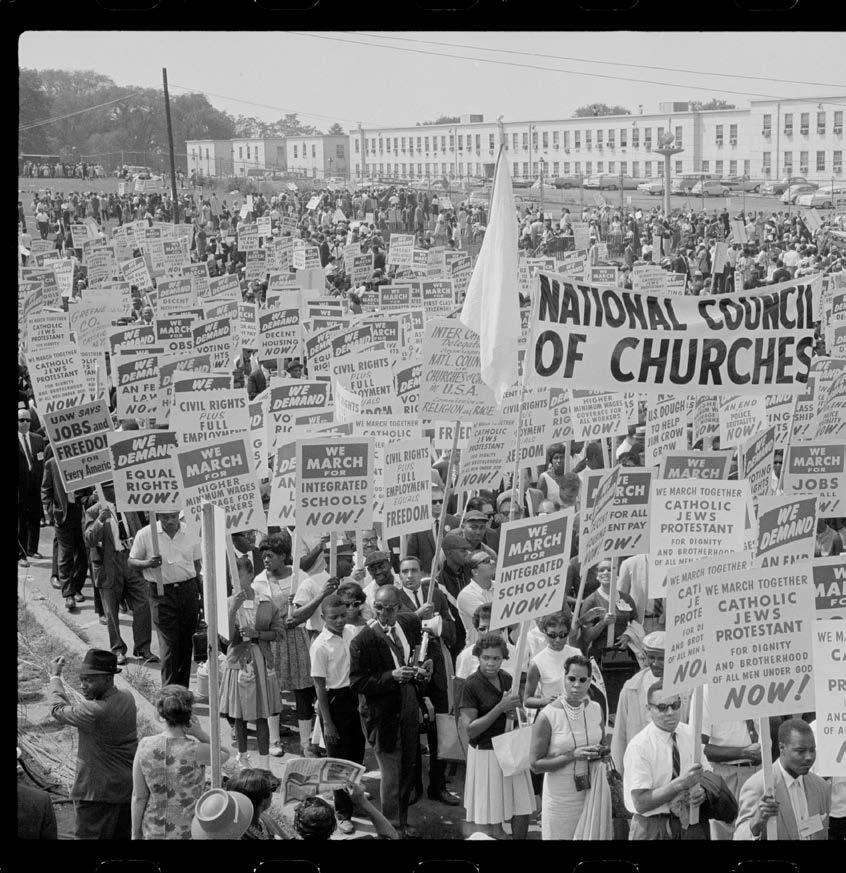
In 1955, the acceleration of the Civil Rights Movement — and its targeted focus on college campuses — sparked numerous investigations into racial discrimination. Across the country, college campuses became sites of protest. Students
and administrators rallied against the Vietnam War, sexual discrimination and racial discrimination.
In the 1960s, civil rights activists and student protestors challenged colleges across the United States and Canada to reconcile their discriminatory admission, housing and social policies. In turn, campus administrators pressured Greekletter organizations to become less discriminatory. Fraternities
and sororities described their defense of membership selection policies as a fight to “safeguard the rights to freedom of choice and association.” Although they did not say so explicitly to campus administrators or to the public, Greek-letter organizations were determined to protest integration. They would defend — at significant cost — their right to discriminate against non-white potential members.
22
Historically, however, a statement of anti-discrimination did not necessarily mean anti-discrimination in practice.
The March on Washington, 1963.
Across the country, historically white sororities began to invite Black women into their membership. Collegians began testing the unwritten rules of membership selection. In 1962, one NPC organization placed one of its chapters on suspension for pledging a “Madison Negro co-ed,” according to The Capital Times.”
The organization's public relations officers reported the suspension “had nothing to do with [pledging that member]," but was because the chapter “fail[ed] to abide by the [sorority’s] rules and regulations, which are ‘secret.’”
Gamma Phi Beta leadership watched with interest. A Grand Council member reached out to
a leader at the aforementioned organization. “I knew that [this leader] would feel terrible about the publicity, … I wanted her to know that we sympathized with her.” She wrote to her fellow Grand Council members describing the conversations and asked, “If [one of this organization's chapters] got away with pledging a Negro, how in the world would the rest of us hold the line?”

In 1965, the federal commissioner of education announced that campuses “harboring any organization with discriminatory practices” would lose access to federal funding as a result of the recent passage of the Civil Rights Act of 1964. Following the announcement, college officials accelerated their objections to Greek-letter organizations.

Campus administrations requested information about Greek organizations’ membership policies, insisting sororities and fraternities provide copies of their constitutions, bylaws and membership selection policies. Some of the North American Interfraternity Conference (IFC) and NPC groups had explicit discriminatory clauses in their governing documents, reserving membership for white individuals. Although Gamma Phi Beta did not have explicit exclusion clauses, the Sorority did discriminate against women of color.
These historically all-white sororities and fraternities organized
and resisted the interference of campus administrators and hired lobbyists and lawyers. Grand Council issued a memorandum to alumnae chapter presidents, alumnae advisors and all international officers, thanking them for writing to their congressional representatives to advocate that Greek-letter organizations be excluded from federal anti-discrimination policies. “Our strength lies in the support of our many members who stand up for the value and integrity of the fraternity system.”
After significant lobbying of elected officials, IFC and NPC secured an amendment to the 1965 Higher Education Act that exempted sororities and fraternities from the anti-discrimination policy, provided they relied solely on their own funding. John C. Trussel, a lawyer representing Gamma Phi Beta and other NPC groups, took great lengths to remind college administrations of the exemption clauses at every opportunity. Trussel attended public meetings on the issue at campuses and kept the sororities he represented apprised of his actions.
In 1966, a dean from Syracuse University wrote to Gamma Phi Beta. The Syracuse University Discriminatory Clause Board, he wrote, was “presently reviewing the selection and rush practices of fraternities and sororities on campus” and asked that Gamma Phi Beta respond to several questions. Grand Council replied
23
PHOTO COURTESY OF THE LIBRARY OF CONGRESS
Breaking Down Our Past
to his letter letter, assuring him, “All membership policies apply equally, without discrimination, to all candidates for pledging or membership.”
The letter from Syracuse University was not alone. Across the United States, campus administrations asked Gamma Phi Beta to file its Constitution and its nondiscrimination policy with school officials. In some cases, colleges increasingly demanded to know how membership selection processes worked. Gamma Phi Beta evaluated each request separately, and wherever possible, denied campus administrators access to any documents regarding membership selection. The sorority did, however, file its Constitution and Bylaws at several schools. Grand Council characterized Gamma Phi Beta’s cooperation with campus officials as done “under protest and always with reluctance.”
The issue touched 58 of the 82 chapters, representing all 14 Gamma Phi Beta provinces and crossing into Canada. All requests for paperwork regarding discriminatory membership policies arrived after 1957, with Gamma Phi Beta observing, “Prior to that time, we do not have any record of having had to file our papers.” At several chapters, university administrators threatened to disallow Gamma Phi Beta on campus if they did not drop the system of alumnae recommendations. The sorority
concluded: “The current trend is [to] attack our recommendation system as a ‘structural mechanism,’ which will permit discrimination.”
Gamma Phi Beta leadership described numerous requests or semi-annual requests to sign administrative paperwork, which they took as “an indication that the harassment will continue.”
Alumnae Recommendations as Tools of Discrimination
Gamma Phi Beta published and publicized anti-discrimination statements, but in private correspondence and in its recommendation system, Gamma Phi Beta simultaneously reinforced its members’ ability to discriminate. Alumnae recommendations, at first an informal tool, quickly grew to a prerequisite for new members. By 1940, Gamma Phi Beta established recommendation committees that yielded “splendid results.”
Gamma Phi Beta hoped the system would “bring closer cooperation between Greek-letter and alumnae members.”
In 1964, an alumna provided a “cannot endorse” recommendation for a new member at a northeastern college. The recommendation included the note: “Sorry, believe this girl to be colored. My husband checked the address, and it is a little better than a slum and in the center of colored belt.” The collegians objected to the “cannot endorse” and raised it to Grand Council.
A Grand President wrote a letter to the alumna who submitted the recommendation. “I am sending the file to you not because I am critical of your sending a ‘Cannot Endorse.’ I shall defend the right of an alumnae to do this until I am breathless! And I also shall defend your right to do this even if, or because of, the fact that she is colored!” Criticizing the media and college campuses for infringing on the right to choose membership, she noted: “We still believe we have a right to choose our friends from among the socially acceptable.”
Both collegians and alumnae felt the responsibility of selecting members. Some chapters enthusiastically supported the recommendation process. Other collegians resisted the recommendation system. A western chapter wrote to Grand Council in 1968 to report that chapter members “feel that they are being controlled by the alumnae and hence, not even given the right to choose their own Sorority sisters.”
Concerns over discrimination were not limited to collegiate members. A recently graduated alumna wrote to Grand Council in 1967 and asked, “What is the official policy of Gamma Phi Beta International toward chapters which pledge and/or initiate Negro members? How are local chapters made aware of this policy? Is any effort being made to encourage local chapters not to discriminate on the basis of race, creed or
24
color?” The letter writer also asked for demographic information, inquiring: “How many Negro girls and how many Jewish girls are at present members of Gamma Phi Beta?” The letter writer also asked if NPC was making any effort to integrate its efforts with Black sororities or fraternities.
Gamma Phi Beta responded with the requirements for membership, deftly skirting the question of whether any policy on file encouraged or discouraged chapters from recruiting Black women. Gamma Phi Beta responded to the requests for demographic information by noting the types of information the sorority kept on file for its membership; data which included name, current address, chapter and date of Initiation. “We have never included facts about race, color, creed or national origin. Therefore, we are unable to give you the number of minority group members within our Sorority.”
Concerns over discrimination crossed the border to Canada, as well. In responding to an alumna living in Vancouver, a Grand Council member described the letter as a “sticky wicket” and indicated it was not the first correspondence of its kind. The Canadian alumna had inquired: “I’m interested to know whether any Gamma Phi Beta chapter has ever pledged — or pledged and initiated — any girl who is Jewish, Oriental, Indian, Negro — or any non-Caucasian. I understand of
Memorandum regarding a request for membership policies. The handwritten response says: “It is surely my recommendation to ignore this questionnaire. It can do us no good to be quoted — particularly by The Saturday Review!”

course that there is no written discriminatory policy.”
While Gamma Phi Beta carefully answered requests from its alumnae and collegians, the organization closed ranks when it came to outside press. In response to a 1965 questionnaire on discrimination from the Saturday Review of Literature, the Executive Secretary asked her fellow Grand Council members: “I suppose we shall ignore this one also?” Her fellow leaders agreed.
In 1970, Gamma Phi Beta Convention attendees voted to amend their Bylaws and removed the provision requiring all new members have an alumnae recommendation. A Grand President assured alumnae they could still submit a voluntary recommendation. In identifying
potential benefits of the change, this Grand President noted that “fine girls of Gamma Phi Beta caliber” had been lost in the past because they came from areas where no alumnae could be found to provide a recommendation. She assured alumnae, however, that they could still submit a voluntary recommendation. And while collegiate members gained the ability to investigate and overturn “cannot endorse” recommendations, alumnae received the additional assurance that Gamma Phi Beta’s “standards of members are unaltered.”
In the face of increasing pressure from the public, campus administrators, some collegians and alumnae, Gamma Phi Beta’s high level-leadership cried conspiracy. The Grand President

25
Breaking Down Our Past

declared:
"You need to know this matter of the local collegians deciding 'recommendations must go' is sponsored either directly or indirectly by the administrations in order to get it to appear the decision is coming from the students rather than the school officials. For the pattern to be exactly the same indicates it is a planned program and we have a pretty good idea where it is coming from!
Efforts to characterize their opposition as conspiracy — or label student activists as communists — reflected a deep cultural conservatism enforced by international officials at the time. Gamma Phi Beta leadership participated in the backlash by criticizing and delegitimizing the requests of students and campus administrations and resisting efforts to address systemic discrimination.
Continued Exclusions
In 1962, The Crescent observed: “We have gone beyond the case of clauses; we have gone farther to what is unwritten.” The magazine insisted policies were not put in place “for discrimination, but you see how things are twisted. We are finding that whatever we say is misinterpreted.” But many collegians, alumnae, campus administrators and new members understood what Gamma Phi Beta leadership would not admit: that the “unwritten” rules of the sorority
had been used to uphold systems of discrimination.
The removal of recommendations was brief. The tool returned in the early 1980s, to encourage alumnae engagement and help collegians succeed in recruitment. In the 1990s, new members also needed references outside the formal recruitment process. Alumnae needed to provide recommendations for informal recruitment and continuous open bidding events. Alumnae no longer needed to know a potential member personally but could supply a “factual information only” recommendation, gathered from research in the community or communication with teachers, neighbors or business associates. A standard recommendation form was available from Gamma Phi Beta but additional information could include separate sheets listing activities and accomplishments. Troublingly, the alumnae recommendation manual
noted, “pictures are very helpful,” indicating physical appearance still played some role (spoken or unspoken) in the selection process.
Reintroduced as a voluntary system, recommendations nevertheless continued to play a role in determining membership. In 2021, Gamma Phi Beta introduced a new recommendation system. “Now anyone can recommend young women who would make excellent candidates for Gamma Phi Beta membership,” leadership explained in an email. The new form would be called an “Introduction Form” rather than a recommendation. It could be submitted by anyone, including the person going through recruitment and would “not devalue recommendations from Gamma Phi Beta alumnae.”
“No statement is enough for us to undo the role fraternities and sororities, including our own, have historically played in explicitly and implicitly contributing to systemic racism in the United States.”
—Gamma Phi Beta Statement, June 5, 2020
Leadership envisioned the form as a crucial tool to broaden recruitment opportunities. “We are steadfast in our commitment to making Gamma Phi Beta a place of belonging and inclusion. We have struggled for years to reconcile the values of equality and non-discrimination with practices that knowingly provide extra advantages to women seeking membership,” the email continued. The new Introduction Form, in conjunction with removing preferential treatment for legacies, reinforced the organization’s commitment to making Gamma Phi Beta a “more welcoming and inclusive” place.
The Edgewater Conference

Joining national organizations like NPC brought Gamma Phi Beta in close contact with other Greekletter organizations, many of which discriminated against non-white and non-Christian members. By
1928, for instance, more than half of the IFC fraternities explicitly excluded potential members based on race or religion.
Even among the exclusive ranks of NPC and IFC, some fraternities and sororities created another group to address their concerns over how Greek-letter organizations would be run. In 1952, leaders of select fraternities met at the Edgewater Hotel in Chicago. They united under a “belief in the inherent vales of collegiate fraternal organizations and the right to self-determination in the selection of membership thereof.” The secretive Edgewater Conference included representatives from many of NPC’s founding sororities. Historian Margaret L. Freeman characterized the group as “xenophobic and white supremacist.”
Edgewater resisted racial integration and opposed
investigations into discrimination. During the 1960s, Edgewater members tightened ranks and relied on one another to present a united front. In 1965, an IFC fraternity president sent a letter to Edgewater members requesting copies of statements and documentation the organizations could use “to put oil on the water” of unrest. The public presentation of anti-discrimination statements occurred simultaneously to closedoored meetings where the right to discriminate remained a shared Greek-letter organization priority. Edgewater attendees continued to advocate for discrimination throughout the rest of the century. At the 1978 Edgewater Conference in Arlington, Texas, attendees discussed issues such as the “Gay Liberation Infiltration Threat,” signifying an intent to discriminate based on sexual identity and expression.
Breaking Down Our Past
In 2019, Gamma Phi Beta’s IC reported that Edgewater’s membership would be expanded to include all 26 NPC organizations and that the conference would be renamed.
Religious Discrimination
Gamma Phi Beta did not just discriminate based on perceived race. The organization also discriminated on the basis of religion.
Although organizations relied on religious preference to determine their membership (and to shape their membership experience) throughout the 20th century, the effort to discriminate on the basis of religion gained ground in the 1910s. Religious preference, especially when used to exclude new immigrants from Eastern or Southern Europe, reinforced a broader pattern of racism and discrimination occurring in America. Excluding Jewish and Catholic members gave Greekletter organizations an excuse to exclude Irish, German, Italian, Polish and other new immigrants. Well-educated, prominent American social commentators (including President Theodore Roosevelt) stoked fears of “race suicide,” alleging that AngloSaxon citizens would be overrun by foreign-born immigrants. The number of Jewish immigrants coming to the United States increased exponentially between 1880 and 1917, and the community became a target of
antisemitism and discrimination. Strict immigration codes passed in the 1920s meant that the United States, a beacon of economic opportunity, had closed its doors to newcomers, including Jewish refugees, Asian immigrants and many migrant workers from South America.
Many colleges created additional obstacles to keep out foreignborn students, such as entrance exams. Sororities implemented new membership guidelines. In a 1926 survey, the majority of NPC organizations reported restrictions in their membership selection policies. Five of the 17 organizations explicitly restricted
their membership to women of Christian faith. Many others admitted to informal or unwritten exclusion policies at either the local or national level.
National Panhellenic Conference began implementing exclusion policies not at the time of their founding but in the 1910s, almost certainly as a response to the broader cultural fears of immigrants and “race suicide.”
Because many fraternities and sororities refused to admit them, Jewish and Catholic collegians created their own organizations. In 1924, four sororities petitioned to join NPC. Gamma Phi Beta’s

28
Over time, Gamma Phi Beta intentionally adjusted its ritual and meetings to be more inclusive of other religions.
NPC delegate reported to The Crescent : “Two were Jewish, one was Catholic and one was Masonic. Thus, the Congress was confronted with two serious questions. Shall we encourage specialized fraternities by admitting them to NPC?” National Panhellenic Conference voted not to include any of the four in their joint organization, affirming a precedent that not only would sororities not admit Jewish women on an individual level, but they also would not work cooperatively with Jewish sororities.
The Crescent reprinted an article from another NPC group's magazine, responding to accusations of exclusivity in the membership selection processes of sororities. That sorority roundly dismissed accusations of excluding women based on family occupation and said: “As to dropping a girl because she was Jewish, that too would be a matter of local feeling, probably, as Jewish women are frequently found in fraternities to my personal knowledge, and are as likely as not to be most brilliant and popular.” The “local feeling” against Jewish women was in full force among NPC organizations elsewhere. One organization had a formalized policy of rejecting Jewish applicants. Two other NPC groups allowed individual chapters to reject Jewish new members.
Gamma Phi Beta’s relationship with religion has changed over time. In 1947, NPC admitted one Catholic sorority and four Jewish

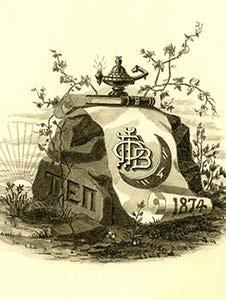
sororities to associate membership. A year later, a Grand President reported to an inquiring member that “of the Christian faith” had once appeared in Gamma Phi Beta’s recruitment rules, but she could not find it and was confident it had been removed “many years ago.”
Yet, religious discrimination persisted. In 1953, an alumnae group in the Pacific Northwest wrote to Gamma Phi Beta leadership and asked them to advise on a question that arose during a monthly meeting. “What is the policy of Gamma Phi Beta toward pledging girls of Jewish faith?” they asked. “We felt it might be best to go directly to headquarters for information.
Gamma Phi Beta’s relationship with religion has changed over time.
No such problem has arisen, but of course might at any time.”

Gamma Phi Beta responded to say, “There is nothing in the Constitution or Bylaws of Gamma Phi Beta which restricts our membership selection because of race, creed or color.”
In 1955, a Grand President explained that a Florida chapter had requested information on the policy of admitting Jewish women. The Grand President “felt that such a policy was better
29
Breaking Down Our Past
given verbally than on the printed page.” After continuing “trouble” — which she did not describe — the Grand President put the policy in writing. She noted, “We do not intend to distribute it to chapters.”
Gamma Phi Beta’s “Statement of Policy regarding Jewish Girls,” advised that “Jewish girls should be considered on the same basis as any others.” Gamma Phi Beta alumnae were therefore welcome to recommend Jewish women as new members. However, “If the alumnae of her home community feel that a Jewish girl would detract from the prestige of Gamma Phi Beta, then they have not only the right but the responsibility to refuse clearance.”
Some chapters resisted identifying their members’ religious identities. In 1964, the president of a midwestern chapter wrote a letter to Grand Council requesting “Religious Preference” be removed from the recommendation form. A Gamma Phi Beta Grand President replied: “We studied your reasons for making this request, but after thorough consideration, we voted unanimously not to make this change. The information is important to the Sorority. Our members need to understand that the ritual of Gamma Phi Beta is based on the teachings of the Christian religion, and we need to know that the members whom we select can conscientiously adhere to our principles. If they cannot, then they should not be considered for membership.”
It is difficult to quantify when Jewish members began joining Gamma Phi Beta. In reflecting on its executive council of 1966, a western chapter remarked on the diversity of the leadership team, which included a Jewish member, a first-generation Serbian American member and a member “whose thick, dark hair and olive skin tones reflected her Mexican heritage.” A member initiated in 1966 remembered that the chapter recruited “lots of great girls who just happened to be Jewish,” a point of pride because many other organizations on campus discriminated against non-Christians. By 1978, a chapter felt comfortable reporting to The Crescent that one of its members had the honor of serving as president of the “campus Jewish organization.”
Over time, Gamma Phi Beta intentionally adjusted its ritual and meetings to be more inclusive of other religious. In 2021, Gamma Phi Beta posted to its Instagram on the first day of Ramadan, a Muslim holiday. The organization posted again on Eid al-Fitr, the feast ending a month of fasting.
“We hope Ramadan has been a peaceful time for you, sisters!” The organization also acknowledged the Hindu festival of Holi and the Jewish holiday of Passover. In a very real and visible way, Gamma Phi Beta acknowledged publicly — and tacitly approved — that its members participated in a number of cultural traditions and religions.
Historical Reckonings
The length of this article cannot capture the multiple ways Gamma Phi Beta has used its membership selection policies to discriminate for over a century. It does not grapple with discrimination based on sexuality. It does not address how different communities of color experience discrimination differently, or how regional differences and change over time have changed the targets of racial discrimination. It does not address economic prejudice or barriers facing individuals with disabilities. It particularly fails to address how identities can intersect to compound discrimination. There are other experiences that need to be acknowledged.
Gamma Phi Beta’s existing history resources — published books, member education and digital materials — do not engage with the history of discrimination that has impacted the organization since its founding. For example, a Personal and Chapter Enrichment (PACE) pamphlet contextualizing Gamma Phi Beta’s history remembered the 1910s with the following sentence: “During the first decade, women began to vocalize their demand for suffrage. The right to vote was denied only to criminals, lunatics and women.” In reality, the United States government denied the right to vote to many groups: Indigenous Americans (who did not gain citizenship until 1924) and Black Americans (who faced significant barriers to voting up to and beyond the
30
passage of the 1964 Civil Rights Act). Another example comes from Gamma Phi Beta’s history book, “The Gift from Syracuse,” in which historian Charlotte Hamilton Mason accused students and administrators of levying “charges of unjust discrimination” during the 1960s. Those charges proved to be founded in fact.
At its first Belong, Equity, Diversity and Inclusion (BEDI) Summit, Gamma Phi Beta invited historian Lawrence Ross to speak. In his book, “Blackballed: The Black and white Politics of Race on America’s Campuses,” he criticized white unwillingness to grapple with history:
"Even when forced to confront overt racism, white America has been slow, reluctant and dishonest in recounting that memory, a memory that is deep in their guts, a memory that they know is true. As individuals, white Americans have learned that they can deflect, defuse and delude as a way to maintain the charade: “This is not a race issue. The people who did this are jerks, but this is not about race. This may have been insensitive, but can we move on from this and get back to normal?”

“Because you’re talking about racism, you’re being racist, and that’s the reason why we can’t get beyond race in this country.” “This is not who I am. This is an isolated incident.”
Racism and discrimination on college campuses are not
isolated incidents. Racism and discrimination in sororities and fraternities are not isolated incidents. Racism and discrimination in Gamma Phi Beta are not isolated incidents. They are historical patterns, reinforced by their participants, that continue to repeat themselves and exclude individuals from the very real benefits sorority involvement can provide.
How we remember history — the stories we choose to include and exclude — shapes our understanding of who we are. The Founders created a sorority in which the first generation of college women could find solidarity and security in the face of discrimination. At the same time, our understanding is incomplete if we do not recognize that the Founders and early members created and enforced systems that discriminated against others. For every door that Gamma Phi Beta members opened for themselves, they often explicitly worked to ensure doors remained closed to those who might follow.
As Gamma Phi Beta moves forward, its members have the unique opportunity to amend and reshape the systems of their 150-year-old organization and its many partners: cooperative organizations like NPC and IFC, college campuses across the United States and Canada and the truly international network of alumnae they have gathered in the name of sisterhood.
To learn more about our commitment to BEDI, BEDI resources, this article's bibliography and FAQ, visit GammaPhiBeta.org/ Breaking-Down-Our-Past or scan the QR code.

31
As Gamma Phi Beta moves forward, its members have the unique opportunity to amend and reshape the systems of their 150-year-old organization.
life loyal
Life Loyal is a special program available for all Gamma Phi Beta members to continue their lifelong support of our beloved Sorority beyond their collegiate years while receiving exclusive benefits. This is just one way to continue your lifetime involvement as a member of Gamma Phi Beta while fulfilling your financial obligations with an easy, one-time payment. The dedication of our alumnae members who continue to be involved and financially supportive helps ensure the future of our traditions and sisterhood.
ALPHA (Syracuse)
Dixie Dragon Klingaman
Kathleen Smith Nilsen
Linda Smith Strieter
BETA (Michigan)
Catherine Stachura Donohue
Catherine Szkop
GAMMA (Wisconsin-Madison)
Camille Cook Gilley
Katherine Floberg Kufahl
Laurie Litscher Seifert
EPSILON (Northwestern)
Donna Comstock-Herman
ETA (California-Berkeley)
Karen Kamine Behr
THETA (Denver)
Colleen Peterson
IOTA (Columbia)
Rachel Kenny
KAPPA (Minnesota-Twin Cities)
Merrilee Mattson Lundquist
LAMBDA (University of Washington)
Jean Anderson Allard
Cynthia Keith Alto
Jennifer Hunter
NU (Oregon)
Sara Nicolas
XI (Idaho)
Mary Foster Cronin
OMICRON (Illinois at Urbana-Champaign)
Susan Armstrong
Trinity Nelson
Katherine Vorisek
PI (Nebraska-Lincoln)
Brooklyn Fiddelke
Averie Frye
RHO (Iowa)
Therese VonMaur Trenhaile
SIGMA (Kansas)
Janet Perkins Jehle
Adele Heying Korth
Payton Newell
TAU (Colorado State)
Elizabeth Smith Eichenberger
Devon Bottini Ingo
PHI (Washington University)
Deborah Mabes Crist
Ashley Klein
CHI (Oregon State)
Sylvia Depenbrock Dorney
PSI (Oklahoma)
Jennifer Burns Abrell
Shibani Sona Joshi
Lauren Millender
Reilly Nowland
Kendal Stegmann
OMEGA (Iowa State)
Patricia Weiss DiMichele
Rita McCarthy Swartz

ALPHA ALPHA (Toronto)
Sophia Miranda
ALPHA DELTA (Missouri-Columbia)
Sharon Brunner Purchase

ALPHA EPSILON (Arizona)
Rebecca White Goodman
Morgan Prettyman
ALPHA IOTA (California-Los Angeles)
Julie Miller Scorziell
ALPHA XI (Southern Methodist)
Karen Fickenscher Fox
Erin Giromini
Jennifer Eilers Klepper
Light Sayles
ALPHA TAU (McGill)
Bronwyn Walsh
ALPHA PHI (Colorado College)
Merrie Margolin Stratton
ALPHA CHI (William & Mary)
Caitlin Colucci
Laurie Merner Dillon
BETA ALPHA (Southern California)
Heidi Blair
Sophia Connolly
Ashley Nguyen
Melissa Zonne
BETA GAMMA (Bowling Green)
Holly Sobeck
BETA DELTA (Michigan State)
Theresa Corbett Kunitz
BETA EPSILON (Miami-Ohio)
Alexandra Bagg
Sarah Slagle
Mira Tan
BETA ZETA (Kent State)
Karen O’Leary Beckley
BETA ETA (Bradley)
Maria Lane
32
Thank you to the following sisters who joined Life Loyal between November 1, 2022, through January 31, 2023.
BETA KAPPA (Arizona State)
Janet Achauer Sherman
BETA LAMBDA (San Diego State)
Sarah Johnston
BETA MU (Florida State)
Lauren Becker
Amanda Ashburn McKown
BETA OMICRON (Oklahoma City)
Andie Sheppard-McDermott
BETA RHO (Colorado-Boulder)
Alex Woods
BETA SIGMA (Washington State)
Renee Greenman
Ashley Sherwood Park
Elizabeth Burt Williams
BETA CHI (Wichita State)
Sharon Winfrey Hantla
Sarah Nelson
BETA PSI (Oklahoma State)
Lucile Stewart Hefner
Stacey Mann King-Culpepper
Beverly Frazier Wright
GAMMA ALPHA (Memphis)
Alice Whittington Hollis
Linda Dabney Patterson
GAMMA GAMMA (Wisconsin-Milwaukee)
Megan Mahoney Derkey
Hannah Hennessy
Shelby Woodward
GAMMA DELTA (Wyoming)
Carol Nelson Tamparo
GAMMA EPSILON (Puget Sound)
Laura Kukulan
GAMMA ETA (California State-Long Beach)
Chelsea Ewert Hartman
THE GIFT OF
Life Loyal
Jean Mann
GAMMA KAPPA (Nebraska-Kearney)
Dana Richardson Patterson
GAMMA MU (Moorhead State-Moorhead)
Jenica Rae Hancock
Sarah Gunkelman Knutson
GAMMA XI (Tennessee-Knoxville)
Susan Taylor Bryant
Constance Didlake Cole
GAMMA OMICRON (Kentucky)
Alyssa Hargis
GAMMA OMEGA (Wisconsin-Platteville)
Tess Mangan
DELTA DELTA (California State-Fullerton)
Chelsea Hodis Lamb
DELTA EPSILON (Texas Wesleyan)
Sally Stevens Burress
DELTA THETA (California Polytechnic State)
Amber Butler Karson
DELTA IOTA (Purdue)
Barbara Hoerner Burk
DELTA SIGMA (Florida Institute of Technology)
Alyssa Carson
DELTA TAU (Colgate)
Kylie Geer
DELTA UPSILON (Georgia)
Jessica Hicks
DELTA CHI (California State-Sacramento)
Ashley Arias
Celebrate a Gamma Phi in your life with the gift of Life Loyal! A one-time payment of $299* will fulfill the recipient’s international alumnae dues obligations for life and unlock exclusive benefits to them (like a lifelong subscription to The Crescent). Don’t know a specific Gamma Phi who would appreciate this gift? No problem! Consider supporting a graduating senior with a Life Loyal membership to keep them connected to their Sorority as they transition from a collegian to an alumna.
To learn more, visit GammaPhiBeta.org/Membership/Life-Loyal/About-Life-Loyal
*We are pleased to offer Gamma Phi Betas who initiated in or before 1971, a reduced one-time membership dues fee of $189.

DELTA PSI (California-Santa Barbara)
Linda Wellman Tossick
EPSILON THETA (Clemson)
Margaret Budlong
EPSILON LAMBDA (Alabama)
Haley Davis
Shaylin Reagan
EPSILON MU (Loyola-New Orleans)
Jamie Blanch
EPSILON NU (Chapman)
Jenna Newman
Tiffany Payton
EPSILON PI (George Mason)
Katherine Goodwin Swarthout
EPSILON SIGMA (Morehead State)
Kelli Oldham Bralley
DeAnna Stinnett
ZETA GAMMA (Sonoma State)
Peyton Vernon
ZETA ETA (Lander)
Allyson Youmans Brown
ZETA IOTA (Valparaiso)
Kylee Steuer Bentley
Joy Kassel
ZETA KAPPA (Southern Indiana)
Amanda Eads Becker
ZETA RHO (Texas A&M-College Station)
Jade Sung
ZETA SIGMA (South Carolina)
Sarah White
ZETA PHI (Arkansas-Fort Smith)
Abby Hawes
ZETA CHI (Texas Christian)
Grace Pizzala
ZETA OMEGA (Kennesaw State)
Sophie Sisavath
ETA XI (Florida)
Violet Comber-Wilen
Ellen Fleming
Amy Roesch
ETA OMICRON (Ohio)
Mary Voinovich
ETA PI (QUINNIPIAC)
Eden Montgomery
ETA RHO (Nevada-Las Vegas)
Chloe Love
ETA SIGMA (Central Missouri)
Sydney Wehmeyer
33
MEMORABLE MENU ITEMS
College Fresh chef-prepared dishes that bring sisters together
Food connects us. And when we gather in community to eat, something magical happens: storytelling, conversation, laughter — the formation of cherished memories. The anchor to these memories? Homemade meals made with TLC. Thanks to College Fresh, the official food service partner of the Facilities Management Company (FMC), our live-in members get that magical experience with their sisters. This got us wondering: What College Fresh chef-prepared dishes do our live-in members love creating precious memories over with their sisters?
At Theta Chapter (Denver), it's Chef Robert's Build-YourOwn (BYO) Ramen Bowl. A fun twist on a college staple, Chef Robert’s BYO Ramen Bowl allows members to get creative with toppings while accommodating all dietary needs and restrictions. Of his time working with Gamma Phi, Chef Robert says, “It has been very rewarding. The women treat me like family and are always very appreciative.” He continues, “Members will often suggest menu ideas and request repeat appearances of their favorite meals, making menu planning a breeze. I also love introducing them to new or unfamiliar foods, creating exciting culinary memories.”
Lasting Bites
Here’s some other memorable dishes our followers on Instagram remember from their collegiate days.
Samantha Wagner (Alpha): Chef Mike’s Customizable Paninis
Sue Weston Viecelli (Michigan State): Our Cook Rose’s Gooey Cinnamon Rolls — 50 years later, my chapter sisters and I still reminisce about them!
Karen Maag (California-Los Angeles): Our Cook Wincey’s Friday Morning Coffee Cake. You had to wake up early to snag a slice before it was gone (and it went fast!)
Lauren McGuire (Michgain State): Pesto Turkey Sandwiches
Jenna Palmer (South Carolina): Pesto Turkey
Chef Robert’s BYO Ramen Bowl
Ready in 30 minutes
TOPPING SUGGESTIONS
Grated carrots
Diced tofu
Chopped scallions
Broccoli florets, bias cut asparagus or half-moon cut zucchini
Hard boiled eggs
Diced red onion
Diced red, green and yellow peppers
Shaved protein of choice (e.g., pork, chicken or beef)
Cilantro leaves (optional)
NOODLES
Ramen noodles (3-ounce per serving)
RAMEN BROTH
8 quarts cold water
1 tablespoon red pepper flakes
1-1/2 tablespoon coriander seed
2 star anise
1 onion, roughly chopped
8-10 tablespoons miso paste
Cook noodles according to package instructions.
In a separate pot, combine all broth ingredients, except miso paste.
On medium-low heat, heat broth mixture until it boils.
Strain broth and return to heat.
Stir in miso paste and return to a boil.
Serve bowl hot with noodles, broth and toppings of choice.

34
1 2 3
4 5 6
LET'S mak e THIS!
Other College Fresh chef-prepared dishes members love!

• Chef Scottie’s Chicken Fried Rice at Epsilon Lambda Chapter (Alabama)
• Chef Sean’s Teriyaki Salmon at Beta Chapter (Michigan)
• Chef Craig’s Mardi Gras-themed Ice Cream Social at Psi Chapter (Oklahoma)
35
Change CELEBRATING

Through her philanthropic work, both within and outside Gamma Phi Beta, Sally Wallace (Oklahoma State) is a fierce advocate for equity and inclusion.
For the past 34 years, Sally Wallace (Oklahoma State) has called Chicago home. It’s where she furthered her career as an executive coach, working for non- and for-profit companies, by examining the behaviors of C-suite leaders. It’s where she primarily raised her now-grown adult sons. And finally, it’s where she’s been a longtime donor to social justice organizations. The Greater Chicago Food Depository, Oak Park Regional Housing Center and Race Conscious Dialogues are just a few (of many) organizations that have felt Sally’s impact.

“My personal values have always focused on marginalized people and what I can do as a person of privilege to break down barriers and advocate for equity and inclusion. I participate in volunteer and learning opportunities that [the aforementioned] organizations provide and help raise funds to continue their work,” Sally explains.
When Sally learned about Gamma Phi’s inaugural Belong, Equity, Diversity and Inclusion (BEDI) Summit in 2021, she felt like her values and
passion for BEDI work were finally aligned with her other passion: her sorority. She has attended every BEDI Summit since then. And last year, Sally was a match donor for our first-annual Gamma Phi Gives Day, where her funds directly benefited BEDI initiatives within Gamma Phi Beta.
“I was thrilled to be asked to be a match donor. I was proud that Gamma Phi was continuing to recognize the need for educating our collegians and alumnae about belonging, equity, diversity and inclusion in our own organization. And, I was proud of my Sorority for meeting the BEDI match,” Sally says.
Sally has always been proud to call herself a Gamma Phi since joining Beta Psi Chapter at Oklahoma State University in 1970. During recruitment, she was drawn to her chapter sisters’ honesty and authenticity, adding, “I felt genuinely welcomed [from the beginning], and I have lifelong friendships with some of those women
36
today. Reunions are so much fun!”
Gamma Phi Beta is one that evolves with the times. For this reason, Sally beams with even more pride as a member. She elaborates, “Our Sorority was founded to provide a [safe space] for women at a time when there were none. And now, we have the privilege to continue in that spirit by including all women in Gamma Phi, regardless of race, gender identity or disability. We must continue to provide the necessary learning opportunities for our sisters to expand their world and understanding about others who are different than us.”
Through her philanthropic work, both within and outside Gamma Phi Beta, Sally hopes to continue to raise people’s awareness and understanding of marginalized groups and how, through volunteering or donating, we can ensure everyone has access to equitable schools, housing,
food sources and medical services. To the younger generations in particular, Sally stresses the importance of getting involved in philanthropic work
today so that future generations can thrive.

“Your philanthropy, especially if it’s focused on areas of equity and inclusion and social justice issues, can begin with donating your time and talent to organizations you are passionate about and issues you want to see resolved in the world you live in. And dollar donations do not have to be large. Every single dollar counts and can go far in helping its targeted community.”
When this social justice advocate and humanitarian isn’t searching for the next organization to support, she loves doing Pilates and Tai Chi, participating in a Gamma Phi alumnae book club and attending various cultural events in Chicago.
“I also enjoy traveling to places far and wide. And, as you can imagine, I am drawn to the social justice issues I see there.”
37
"MY PERSONAL VALUES HAVE ALWAYS FOCUSED ON MARGINALIZED PEOPLE AND WHAT I CAN DO AS A PERSON OF PRIVILEGE TO BREAK DOWN BARRIERS AND ADVOCATE FOR EQUITY AND INCLUSION."
HEARTS
We acknowledge the passing of the following members and celebrate their part in our circle of sisterhood. This list reflects notifications received at International Headquarters between November 1, 2022, through January 31, 2023. First, maiden, last names and year of Initiation are listed for each deceased member.
Honor a sister with an In Memory Gift. To make an In Memory Gift, visit GammaPhiBeta.org/Donate or call 303.800.2890. View Memorial gifts online at GammaPhiBeta.org/InMemory.
BETA (Michigan)
Janebeth Schaberg Chapman, 1957
GAMMA (Wisconsin-Madison)
Donna Murphy Olfson, 1950
ETA (California-Berkeley)
Genevieve Jewett Williams, 1958
Barbara Hart Wilson, 1942
LAMBDA (University of Washington)

Helen Murrow Best, 1949
Nancy Murrow Greulich, 1952
NU (Oregon)
Susan Lynn Rubin, 1981
OMICRON (Illinois at Urbana-Champaign)
Janice Clark Impey, 1946
Virginia Willke Weyrens, 1954
SIGMA (Kansas)
Sara Clawson Colt, 1959
PHI (Washington University)
Janet Hannan Penniman, 1953
PSI (Oklahoma)
Linda Hudspeth Croak, 1960
Maryanne McManus Fischer, 2013
Gloria Cantrell McMurry, 1947
OMEGA (Iowa State)
Miriam McKee Cerveny, 1953
Ruth Dickerson Hansen, 1954
Mildred Bretnall Long, 1947
Melena Adams Ose, 1945
ALPHA BETA (North Dakota)
Mildred Fredlund Vorachek, 1963
ALPHA DELTA (Missouri-Columbia)
Elizabeth Campbell Hocker, 1948
ALPHA EPSILON (Arizona)
Elizabeth Acker Richmond, 1947
ALPHA ZETA (Texas-Austin)
Patsy Sengel Finch, 1953
Melinda Milstead Nickless, 1971
ALPHA ETA (Ohio Wesleyan)
Shirley Gordon Hansen, 1950
38
ALPHA XI (Southern Methodist)
Nancy Carevic Hampton, 1961
Nancy Price Murrow, 1946
ALPHA PI (West Virginia)
Barbara Tucker Bucy, 1959
BETA ALPHA (Southern California)
Jane Schuyler Hornung, 1953
Janet Reese Poteete, 1946
BETA EPSILON (Miami-Ohio)
Diane Christman Sullivan, 1954
BETA ZETA (Kent State)
Linda Ross Shaw, 1947
BETA ETA (Bradley)
Sylvia Manjarrez Walker, 1960
BETA THETA (San Jose State)
Mary Gillis Hanson, 1957
BETA PI (Indiana State)
Judith Tyler Bradley, 1959
BETA TAU (Texas Tech)
Linda Rice Chamberlain, 1968
Leslye Lemmons Faulkner, 1994
BETA PHI (Indiana)
Mindy Lou Broomall, 1972
GAMMA XI (Tennessee-Knoxville)
GAMMA RHO (Wisconsin-Oshkosh)
Kathleen Walsh Kunde, 1985
GAMMA PHI (AUBURN)
Juanita West Ausbon, 1968
DELTA DELTA (California State-Fullerton)
Laurel Alexander, 1977
ETA DELTA (Grand Valley State)
BETA GAMMA (Bowling Green)
Maryanne Rose Alic, 1966
BETA DELTA (Michigan State)
Sandra Shields Johnson, 1953
Betty Murphy Schulz, 1951
BETA KAPPA (Arizona State)
Carolyn Moore Wood, 1962
BETA OMICRON (Oklahoma City)
Jan Bryant McRee, 1951
JANEBETH SCHABERG CHAPMAN
BETA (Michigan, 1957)
A lot of good came from attending the University of Michigan for Janebeth Schaberg Chapman. It’s where she joined our True and Constant sisterhood at Beta Chapter. She became one of the first graduates of the university’s new dental hygiene program. And it’s where she met her husband, Donald Chapman, of 59 years. The couple called Madison, New Jersey, home for over 35 years. It is also where they raised their three daughters: Jennifer, Emily and Carolyn. Janebeth worked as a dental hygienist at different Madison-based dental offices. Her favorite part of her job, as her online obituary states, was “getting to know her patients and watching them grow up over the years.” Janebeth was actively involved in her community, volunteering with the Women’s Club, the Thursday Morning Club, local hospitals and her church. When she and her husband retired, they moved to Cape Cod to enjoy the beach. While there, Janebeth continued volunteering for local organizations and clubs. “In the last years of her life, Janebeth lived with Alzheimer’s. A composed, gracious and selfless lady, Janebeth faced the disease and dementia with those exact qualities. She smiled until the end.”
Sara Baskin Nichols, 1965
Leana Raney Roach, 1965
GAMMA OMICRON (Kentucky)
Bernadette Gillet Long, 1977
DIANE CHRISTMAN SULLIVAN



BETA EPSILON (Miami-Ohio, 1954)
Kristin Madendorp, 2010 Visit
Ohio native Diane Christman Sullivan joined our sisterhood at Beta Upsilon Chapter at Miami University in Oxford, Ohio. A passionate traveler, Diane became a New York City-based flight attendant for Trans World Airlines (TWA). Barbara Burke, a former TWA flight attendant who worked with Diane, says of their time traveling together, “We bid flights so we could work together and take vacations using our TWA passes. We had so much fun. Diane meant the world to me. Her support was unconditional. Her strength was amazing. She was such a beautiful person inside and out.” Once she retired, Diane joined her local Clipped Wings Chapter, allowing her to participate in philanthropy events and stay connected to former flight attendants. Beyond traveling, Diane loved entertaining, listening to piano music and spending time with her family. Barbara adds, “Diane was very special.”
39
GammaPhiBeta.org/Foundation each month to view updated Memorial Gifts and In Celebration pages.
Vibes
Your guide for finding the Gamma Phi Beta aesthetic in everyday places.
Treat Yourself
1. Madison Park (Amazon) | Abstract Wall Art (Bliss) $58

2. Kingdom Studio Crafts (Etsy) | Women Empowerment Digital Print $6

3. Nouvelle Mere (Etsy) | Carnation Print $10-$50
4. Wayfair | Crescent Moon Shining Sun Watercolor Landscape $107
5. Ren Lamp (Etsy) | Crescent Moon Sconce $74
6. Printy Shop UK (Etsy) | Set of Three Marble Prints $18+

Products and prices were compiled in April 2023 and are subject to change.

PHI
GAMMA
1 40 2 Wall Art Edition





3 5 6 41 4
As we prepare to celebrate our sesquicentennial, we are embarking on a new endeavor — The Gamma Phi Beta 150th Anniversary Oral History Project — to collect the stories of alumnae in their own words. We’ve partnered with industry leader PCI to help us collect updated information and stories from members. PCI has already begun contacting alumnae by mail, phone and email, asking for their participation. Your stories will be transcribed and preserved in a book that celebrates the impact Gamma Phi Beta has had on your life. We thank you, in advance, for your participation.
Each 2023 issue of The Crescent will contain an ad that reveals a larger picture dedicated to our 150th Celebration (happening next year!). Here’s what you need to do:
• Tear out each issue’s ad (there will be four in total).
• Piece the images together each season to reveal the bigger image.
• Once you have the completed image, post it on social and tag us @GammaPhiBetaSorority.
Parents
While our members are in college, their copy of The Crescent is sent to your home address — we hope you enjoy reading our magazine, too! If your daughter is no longer in college, or is no longer living with you, feel free to send us her new address by emailing thecrescent@gammaphibeta.org
Join Our Green Team!
Receive each issue of The Crescent before everyone else by going digital! We’ll send the current issue directly to your inbox so you can enjoy it anywhere you go. Email thecrescent@gammaphibeta.org today to let us know you’re joining The Green Team!
©2023 Gamma Phi Beta Sorority
The Crescent of Gamma Phi Beta (USPS 137620) is published quarterly by Gamma Phi Beta Sorority, 9155 E. Nichols Ave. Suite 330 Centennial, CO 80112. Periodicals postage paid at Englewood, CO, and at additional mailing offices. Produced in the U.S.A.
Postmaster: Send address changes to The Crescent, Gamma Phi Beta Sorority, 9155 E. Nichols Ave. Suite 330 Centennial, CO 80112.
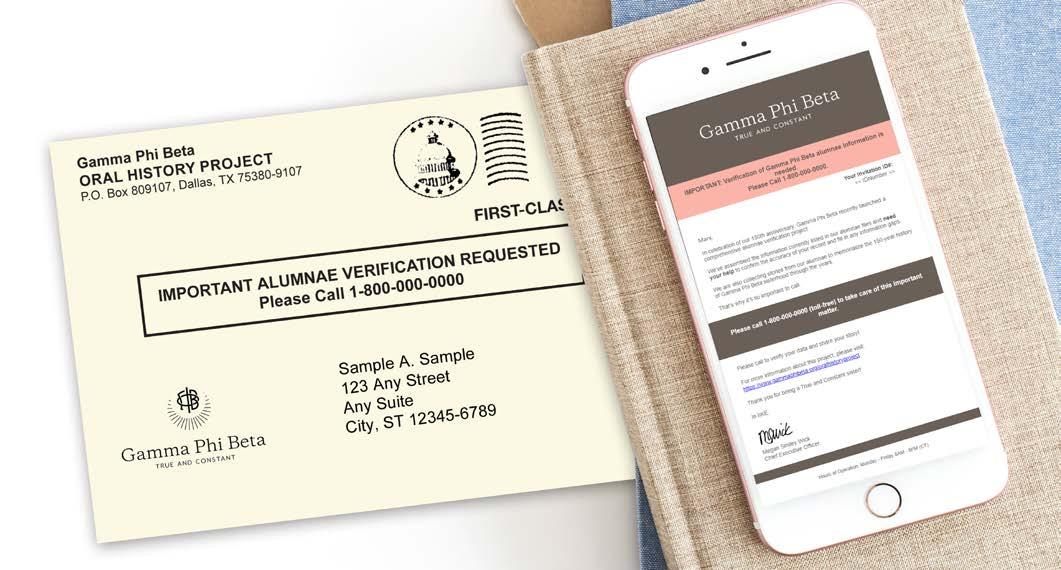
Looking to connect with a sister?
Visit GammaPhiBeta.org/Find-A-Member for a full directory of Gamma Phi Beta members!
International Headquarters 9155 E. Nichols Ave. Suite 330 Centennial, CO 80112 P 303.799.1874 F 303.799.1876
GammaPhiBeta.org
thecrescent@gammaphibeta.org
The Crescent Staff
EDITORIAL MANAGER
Elizabeth Liberatore eliberatore@gammaphibeta.org
CREATIVE MANAGER
Maddy Chapman (Minnesota-Twin Cities) mchapman@gammaphibeta.org
CHIEF MARKETING OFFICER
Tara Foristal tforistal@gammaphibeta.org
CHIEF EXECUTIVE OFFICER
Megan Wick (Washington State) mwick@gammaphibeta.org
CONTRIBUTING WRITERS
Christina Glickman (Kansas)
42
SPRING 2023 Volume 125, No. 2







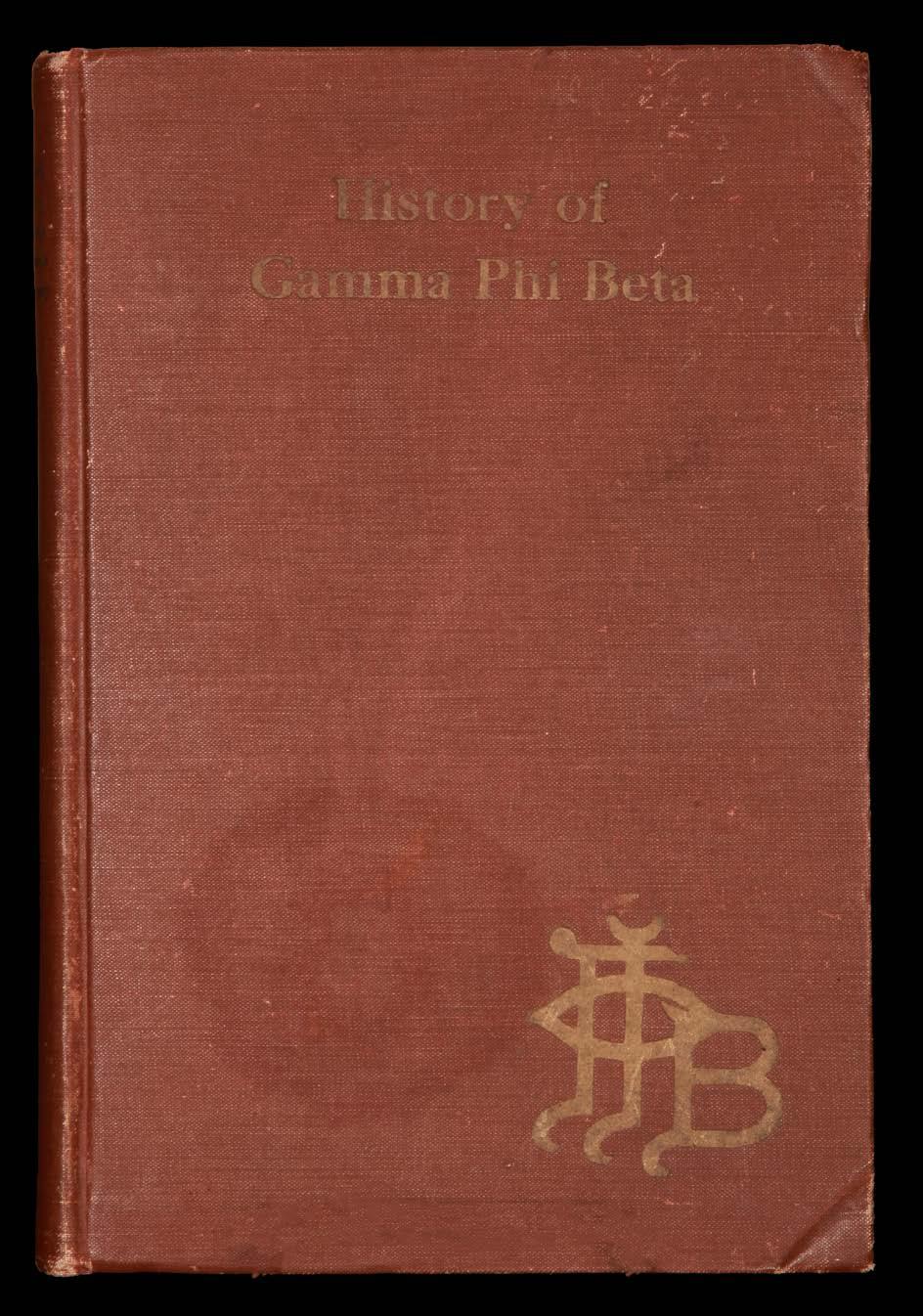
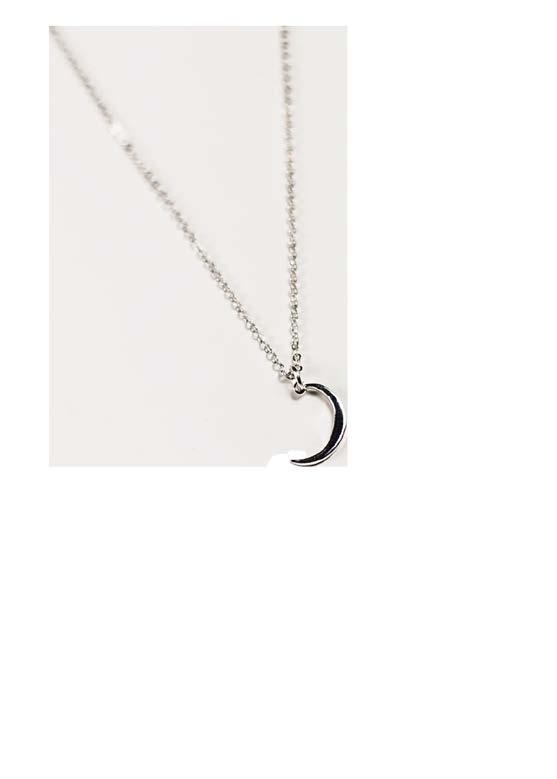




44 Nominate and Celebrate a Deserving Member Today! Know a sister who has made an impact in the world around them? We want to recognize them at Convention 2024! Criteria and nominations for the Carnation and Honor Awards can be found at GammaPhiBeta.org/HonorRoll and GammaPhiBeta.org/CarnationAward until July 31.











 By Christina Glickman (Kansas)
By Christina Glickman (Kansas)

















































































